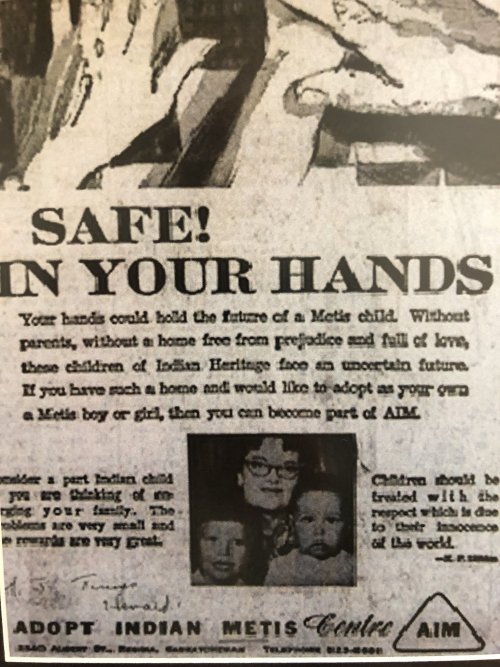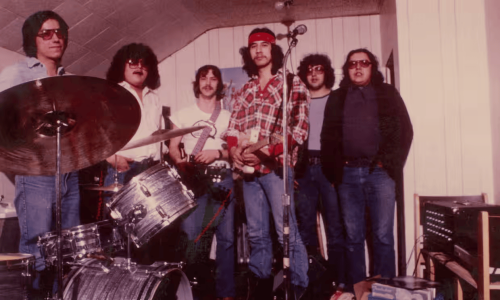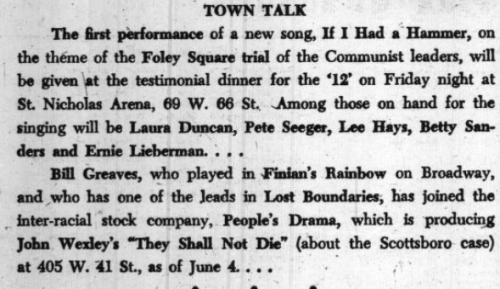
he/him || feel free to ask for suggestions
312 posts
Song Of The Day
Song of the Day
"Call of the moose" Willy Mitchell, 1980 As you might know, September 30th is Truth and Reconciliation day (more commonly known as Orange Shirt Day), a national day in Canada dedicated to spreading awareness about the legacy of Residential schools on Indigenous people. Instead of just focusing on a song, I also wanted to briefly talk about the history of the sixties scoop and its influence on Indigenous American music and activism.
The process of Residential schooling in Canada existed well before the '60s, but the new processes of the sixties scoop began in 1951. It was a process where the provincial government had the power to take Indigenous children from their homes and communities and put them into the child welfare system. Despite the closing of residential schools, more and more children were being taken away from their families and adopted into middle-class white ones.
Even though Indigenous communities only made up a tiny portion of the total population, 40-70% of the children in these programs would be Aboriginal. In total, 20,000 children would be victims of these policies through the 60s and 70s.

These adoptions would have disastrous effects on their victims. Not only were sexual and physical abuse common problems but the victims were forcibly stripped of their culture and taught to hate themselves. The community panel report on the sixties scoop writes:
"The homes in which our children are placed ranged from those of caring, well-intentioned individuals, to places of slave labour and physical, emotional and sexual abuse. The violent effects of the most negative of these homes are tragic for its victims. Even the best of these homes are not healthy places for our children. Anglo-Canadian foster parents are not culturally equipped to create an environment in which a positive Aboriginal self-image can develop. In many cases, our children are taught to demean those things about themselves that are Aboriginal. Meanwhile, they are expected to emulate normal child development by imitating the role model behavior of their Anglo-Canadian foster or adoptive parents."
and to this day indigenous children in Canada are still disproportionately represented in foster care. Despite being 5% of the Total Canadian population, Indigenous children make up 53.8% of all children in foster care.
I would like to say that the one good thing that came out of this gruesome and horrible practice of state-sponsored child relocation was that there was a birth of culture from protest music, but there wasn't. In fact, Indigenous music has a long history of being erased and whitewashed from folk history.
From Buffy Saint-Marie pretending to be Indigenous to the systematic denial of first nations people from the Canadian mainstream music scene, the talented artists of the time were forcibly erased.
Which is why this album featuring Willy Mitchell is so important.

Willy Mitchell and The Desert River Band
This Album was compiled of incredibly rare, unheard folk and rock music of North American indigenous music in the 60s-80s. It is truly, a of a kind historical artifact and a testimony to the importance of archival work to combat cultural genocide. Please give the entire thing a listen if you have time. Call of the Moose is my favorite song on the album, written and performed by Willy Mitchell in the 80s. His Most interesting song might be 'Big Policeman' though, written about his experience of getting shot in the head by the police. He talks about it here:
"He comes there and as soon as I took off running, he had my two friends right there — he could have taken them. They stopped right there on the sidewalk. They watched him shootin’ at me. He missed me twice, and when I got to the tree line, he was on the edge of the road, at the snow bank. That’s where he fell, and the gun went off. But that was it — he took the gun out. He should never have taken that gun out. I spoke to many policemen. And judges, too. I spoke with lawyers about that. They all agreed. He wasn’t supposed to touch that gun. So why did I only get five hundred dollars for that? "
These problems talked about here, forced displacement, cultural assimilation, police violence, child exploitation, and erasure of these crimes, still exist in Canada. And so long as they still exist, it is imperative to keep talking about them. Never let the settler colonial government have peace; never let anyone be comfortable not remembering the depth of exploitation.
Every Child Matters
-
 wandering-between-the-stars reblogged this · 4 months ago
wandering-between-the-stars reblogged this · 4 months ago -
 annoyingdelusioncreation liked this · 4 months ago
annoyingdelusioncreation liked this · 4 months ago -
 artykrisofficial liked this · 4 months ago
artykrisofficial liked this · 4 months ago -
 mini-moonlights liked this · 4 months ago
mini-moonlights liked this · 4 months ago -
 razzleberriesss reblogged this · 4 months ago
razzleberriesss reblogged this · 4 months ago -
 razzleberriesss liked this · 4 months ago
razzleberriesss liked this · 4 months ago -
 quarterchills reblogged this · 4 months ago
quarterchills reblogged this · 4 months ago -
 quartergremlin liked this · 4 months ago
quartergremlin liked this · 4 months ago -
 electricjellyfishtyphoon reblogged this · 4 months ago
electricjellyfishtyphoon reblogged this · 4 months ago -
 electricjellyfishtyphoon liked this · 4 months ago
electricjellyfishtyphoon liked this · 4 months ago -
 sorreleater reblogged this · 4 months ago
sorreleater reblogged this · 4 months ago -
 schrodingers-slut liked this · 4 months ago
schrodingers-slut liked this · 4 months ago -
 germfreeadulthood liked this · 4 months ago
germfreeadulthood liked this · 4 months ago -
 ifeellikeyellowtrash liked this · 4 months ago
ifeellikeyellowtrash liked this · 4 months ago -
 punch-a-bunch liked this · 4 months ago
punch-a-bunch liked this · 4 months ago -
 paranormal-librarian reblogged this · 4 months ago
paranormal-librarian reblogged this · 4 months ago -
 dyvyn reblogged this · 4 months ago
dyvyn reblogged this · 4 months ago -
 screechingmilkshakebear liked this · 4 months ago
screechingmilkshakebear liked this · 4 months ago -
 yumenoyousei reblogged this · 4 months ago
yumenoyousei reblogged this · 4 months ago -
 bethanyeliseart reblogged this · 4 months ago
bethanyeliseart reblogged this · 4 months ago -
 bethanyeliseart liked this · 4 months ago
bethanyeliseart liked this · 4 months ago -
 star-dwelling reblogged this · 4 months ago
star-dwelling reblogged this · 4 months ago -
 chidianaqonye reblogged this · 4 months ago
chidianaqonye reblogged this · 4 months ago -
 star-dwelling liked this · 4 months ago
star-dwelling liked this · 4 months ago -
 ringneckedpheasant reblogged this · 4 months ago
ringneckedpheasant reblogged this · 4 months ago -
 cap-tain-mar-vell liked this · 4 months ago
cap-tain-mar-vell liked this · 4 months ago -
 doublesanjo-blog reblogged this · 4 months ago
doublesanjo-blog reblogged this · 4 months ago -
 alittleannihilati0n liked this · 4 months ago
alittleannihilati0n liked this · 4 months ago -
 lovelyprincejehan reblogged this · 4 months ago
lovelyprincejehan reblogged this · 4 months ago -
 literallyasloth reblogged this · 4 months ago
literallyasloth reblogged this · 4 months ago -
 literallyasloth liked this · 4 months ago
literallyasloth liked this · 4 months ago -
 candiiee liked this · 4 months ago
candiiee liked this · 4 months ago -
 roseybits reblogged this · 4 months ago
roseybits reblogged this · 4 months ago -
 roseybits liked this · 4 months ago
roseybits liked this · 4 months ago -
 sleepyschmoop reblogged this · 4 months ago
sleepyschmoop reblogged this · 4 months ago -
 bloody-glass-cup liked this · 4 months ago
bloody-glass-cup liked this · 4 months ago -
 mybrainnevershutsup reblogged this · 4 months ago
mybrainnevershutsup reblogged this · 4 months ago -
 mybrainnevershutsup liked this · 4 months ago
mybrainnevershutsup liked this · 4 months ago -
 weevil-child reblogged this · 4 months ago
weevil-child reblogged this · 4 months ago -
 weevil-child liked this · 4 months ago
weevil-child liked this · 4 months ago -
 bbee33 reblogged this · 4 months ago
bbee33 reblogged this · 4 months ago -
 bbee33 liked this · 4 months ago
bbee33 liked this · 4 months ago -
 antsday liked this · 4 months ago
antsday liked this · 4 months ago -
 archonburger reblogged this · 4 months ago
archonburger reblogged this · 4 months ago -
 gryphonsoup liked this · 4 months ago
gryphonsoup liked this · 4 months ago -
 fllagellant reblogged this · 4 months ago
fllagellant reblogged this · 4 months ago -
 fllagellant liked this · 4 months ago
fllagellant liked this · 4 months ago -
 majikhara reblogged this · 4 months ago
majikhara reblogged this · 4 months ago -
 majikhara liked this · 4 months ago
majikhara liked this · 4 months ago -
 beanbagbuddies4life reblogged this · 4 months ago
beanbagbuddies4life reblogged this · 4 months ago
More Posts from Folk-enjoyer
Song of The Day
"If I Had a Hammer" Aretha Franklin, 1965
"If I Had a Hammer" was first written in 1949 by Lee Hays and Pete Seeger, and featured on the 1950 cover of Sing Out! magazine vol 1 iss. 1. It was written in support of the progressive party. It was first recorded by the Weavers in 1949 and was performed that same year in New York at a dinner for the communist party.

Daily Worker 1949-06-01: Vol 26 Iss 108
This performance of the song and this Newspaper would be used against Pete Seeger in his HUAC Testimony. He was sentenced to a year in prison for 'Contempt of Congress'. Here is an excerpt of the interrogation.
Mr. TAVENNER: My question was whether or not you sang at these functions of the Communist Party. You have answered it inferentially, and if I understand your answer, you are saying you did. Mr. SEEGER: Except for that answer, I decline to answer further. . . . Mr. SCHERER: Do you understand it is the feeling of the Committee that you are in contempt as a result of the position you take? Mr. SEEGER: I can’t say. Mr. SCHERER: I am telling you that that is the position of the Committee. . . . Mr. SEEGER: I decline to discuss, under compulsion, where I have sung, and who has sung my songs, and who else has sung with me, and the people I have known. I love my country very dearly, and I greatly resent this implication that some of the places that I have sung and some of the people that I have known, and some of my opinions, whether they are religious or philosophical, or I might be a vegetarian, make me any less of an American. I will tell you about my songs, but I am not interested in telling you who wrote them, and I will tell you about my songs, and I am not interested in who listened to them. . . .
Unfortunately, Pete Seeger and the rest of the weavers were blacklisted during the Red Scare, meaning that they were not able to publicly perform "If I Had A Hammer", and they were forced to disband in the early 50s.
In the Biography How Can I Keep From Singing, Pete Seeger remarks on this.
"Why was it controversial? In 1949 only ‘Commies' used words like ‘peace' and ‘freedom.'… The message was that we have got tools and we are going to succeed. This is what a lot of spirituals say. We will overcome. I have a hammer. The last verse didn't say ‘But there ain't no hammer, there ain't no bell, there ain't no song, but honey, I got you.' We could have said that! The last verse says ‘I have a hammer, I have a bell, I have a song.' Here it is. ‘It's the hammer of justice, it's the bell of freedom, the song of love."
With few exceptions, the song was dead for 12 years...
Until Peter Paul & Mary covered it in 1962
This song became a top 10 hit song in America! Since then it has been covered over 200 times. It was one of the top 100 songs of 1962 and is still a popular song today. It transcended genre and many many popular artists including Jimmie Rodgers, johnny cash, and the 'Queen of Soul', Aretha Franklin in 1965.
and, as a happy ending, the weavers performed it again in their reunion concert in 1963.
Also, a thing I like about this song is that it seems to be inspired by the John Henry song "This Old Hammer" based on the lyrics and rhythm. The hammer may have killed John Henry, but it can Hammer the way to freedom as well.
Song of The Day
"Mississippi Goddam" Nina Simone, 1964 "Mississippi Godamn" was written in 1963 in response to the Baptist Street Church Bombing, when the KKK bombed a church and killed 4 black young girls. It also contains references to other racist murders, like the death of Emmett Till and Medgar Evers.
She considered it to be her first Civil Rights song and her debut in the Civil Rights movement. She first performed the song live in Los Angeles, and then again in NYC in 1963. it was released in 1964. She said
"And I was beginning to get angry then. First you get depressed and then you get mad. And when these kids got bombed, I sat down and wrote this song. And it’s a very moving, violent song cause that’s how I feel about the whole thing."
This song is one of the best songs ever written.

Nina Simone, Miles Davis.









